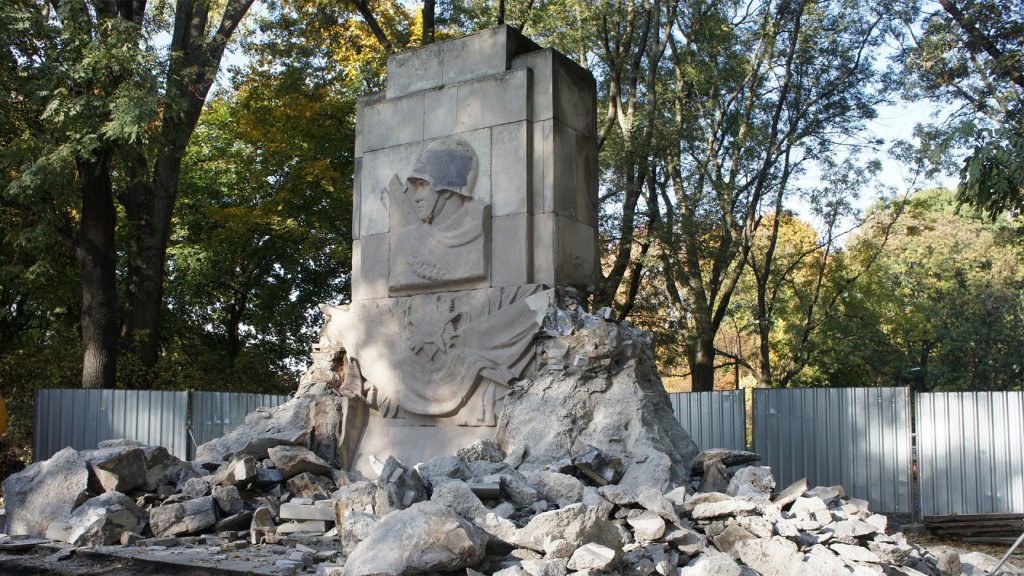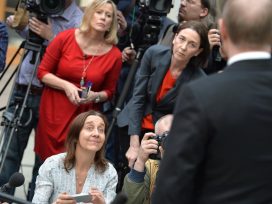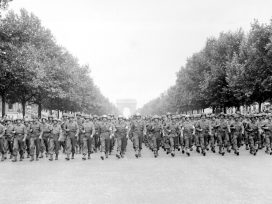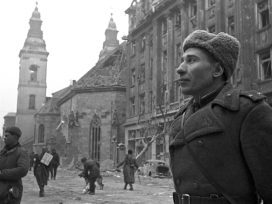New Eastern Europe: On December 20th 2019 Vladimir Putin delivered a speech where he blamed Poland for the outbreak of the Second World War. These remarks caused outrage in Poland. The ministry of foreign affairs issued a statement in which it blamed the Russian leader for undermining joint efforts to find a way to truth and reconciliation in Polish-Russian relations. As director of the Polish-Russian Centre for Dialogue and Understanding in Warsaw, what was your institution’s response?
Ernest Wyciszkiewicz: First let me start by saying that I was not outraged because what took place in December 2019 was actually nothing new. In the past ten years Poland has often been under historical pressure from Russia. Periods of peaceful coexistence were rare and were quickly followed by stormy exchanges. So we have been there before. Yet, what we have been witnessing since Putin’s infamous comments in December is a new level of aggression in Russian historical propaganda, as well as the fact that Poland was specifically chosen as enemy number one in this domain.
What was more surprising for me was the level of Putin’s direct involvement. First, there was a part of Putin’s speech during the December 19th press conference dedicated to the topic. This was followed the next day by an unprecedented, hour-long lecture during an informal meeting of leaders of the Commonwealth of Independent States (CIS) held in St Petersburg. I watched it and saw the stunned faces of CIS country leaders – they had no clue what was going on. Then there was a meeting between Putin and high level military officials, when the topic was raised again, as it was the next day at a meeting with business leaders. Each time, Putin specifically chose history as the major topic and Poland as enemy number one. This was unprecedented.
However, when it comes to efforts to whitewash the Soviet past, there were earlier activities to which we can also refer. Consider the article by Sergey Naryshkin, published last August, just prior to the 80th anniversary of the Molotov-Ribbentrop Pact. Naryshkin is the head of the Russian Historical Society, but he is also the director of the foreign intelligence service. In the article, the interpretation of the Molotov-Ribbentrop Pact is positive. Naryshkin glorified the Soviet decision and assessed it as strategically smart and, in a way, unavoidable. Each year we see these kinds of gestures, but the past year was a bit special. This is because Putin wants to use the upcoming 75th anniversary of the end of the Second World War to address his domestic challenges, to legitimise his goals with a ‘rally around the leader’ effect.
The response of our centre to all this is to continue providing our audience with the facts. For example, we recently became the publisher of the online journal Novaya Polsha (‘New Poland’), which addresses a Russian-speaking readership. In reaction to Putin’s speech, we asked several authors to present the interpretation of the course of the Second World War as established not just in Poland but western academia in general.
As you said, the Kremlin’s historical revisionism is nothing new. But why is Poland the country that is now being targeted and attacked?
Bear in mind that Putin directed his message to several audiences, so he had probably also several purposes. Poland was chosen as the most convenient target for a couple of reasons. First, Poland has become a frontrunner in countering Russian historical disinformation in the European Union. Second, we are in a rather long bilateral dispute with Russia regarding the de-communisation of public space. This dispute is centred around the removal of Soviet monuments, so called ‘monuments of gratitude’, which were erected during the communist era to commemorate the achievements of the Red Army. The Polish efforts to remove them have led to what I would call quasi-religious responses from the Russian authorities, including Sergei Lavrov, the foreign minister, who has accused Poland of blasphemy. As a result, Poland was often presented by Russian media and propaganda outlets as a country that does not respect the blood spilled by the soldiers of the Red Army. This, of course, is a form of manipulation. Poland’s critics pretended they did not know that the dispute referred only to the monuments located in urban areas, not to cemeteries, which are protected by Polish law and whose maintenance is publicly funded.

The monument to Red Army in Skaryszewski Park in Warsaw after being destroyed in 2018. Photo by Tadeusz Rudzki from Wikimedia Commons Tadeusz Rudzki / CC BY-SA
Another issue is Poland’s current position in the EU and the tensions it has with some member states and the European Commission. Poland was chosen as an instrument to potentially drive a wedge between it and other member states and to exploit the fact there are tensions within the EU. I believe that the Russian authorities wanted to amplify this fact and show that Poland also has historical sins. By doing so, they would instrumentalise the current situation and show others that Russia is on the side of those who are apprehensive about the current Polish government. In my view this strategy has failed: the reaction of western commentators and ambassadors shows that they do not buy this narrative.
Poland is seen by Russia as not being grateful enough for the ending of the German occupation by the Red Army on 9 May 1945. We do not see the victory day in the same positive light as the Soviets did in the past or the Russian authorities do nowadays. For the Poles, the end of the Second World War was, of course, liberation from Nazi German occupation. But it did not bring us freedom. By reinforcing the importance of the Soviet contribution to the victory over Nazi Germany, the question of the USSR’s role at the beginning of the war is glossed over. In other words, pointing to what took place in September 1939 is inconvenient for Russia. That is why, when it comes to the end of the war, the Kremlin opted for a clear-cut campaign. But regarding its beginning, a more blurry picture was created.
In the past, especially during communism, the date of 1 September 1939 as the start of the war was not so bad for the Kremlin. But since the Poles started to refer to the Soviet invasion on 17 September 1939, it became difficult to reinforce the myth of the Red Army as the good guys. The truth is that Poland experienced two occupations: the German occupation of its western territories and the Soviet occupation in the east. Russia decided to water down this inconvenient fact and focus on the 1930s – the co-operation between western powers and Hitler, the 1938 Munich Agreement and Poland’s infamous seizure of part of Czechoslovakia. This is an attempt to transform the victim of the war into the main perpetrator.
We have just finished the commemorations of the 75th anniversary of the liberation of the Auschwitz–Birkenau concentration camp. Commemorations were also held in Israel, at Yad Vashem, where Putin was invited to speak. The Polish president, Andrzej Duda, was not given an opportunity to speak and decided not to attend. This seems to show that even though we know the generally accepted truth, Putin and the Kremlin are able to make inroads into these commemorations and get their narratives heard. How do you think we should interpret this?
Fortunately Yad Vashem responded accordingly after the event, saying that a distortion of history occurred during this celebration. To me the logic of this event was quite clear. We had a situation where Putin and Benjamin Netanyahu’s domestic interests coincided, although for different reasons. However, for Russia, the fact that the Red Army liberated Auschwitz-Birkenau and many other death and labour camps is fundamental for painting the Red Army as a purely heroic entity that almost singlehandedly put an end to the Holocaust in Europe. If you are able to establish this kind of connection, then Poland’s effort to remove Red Army monuments can be presented as an indirect form of antisemitism that was allegedly part of the Polish mindset.
This is the intention of the Russian propagandists. Perhaps it even works with some people. We do not question the fact the Red Army liberated the camps. But the problem emerges when you extend this narrative further and create distortions. And this is what happened in Yad Vashem. I watched the celebration and I watched this unfortunate film presenting the history of the Second World War, according to which the German invasion somehow started in 1942, which is complete nonsense to anyone who has attended elementary school. Luckily for all of us, Yad Vashem reacted adequately and sent their apologies for the distortion. What was unfortunate and problematic for me was the fact that we saw a situation where two governments exploited a moment which is very important for the global public opinion to play their own interests – I had a feeling it was not about the victims, the ones who were murdered, and that was very disturbing.
On an earlier occasion last December, Putin quoted the pre-war Polish ambassador to Germany, trying to portray him as an antisemite. The aim was to stress Polish antisemitism, a phenomenon that was obviously present in the 1930s, as something special and extraordinary – even though hostility towards Jews was spread throughout the whole continent at the time. Clearly, the Russian regime identified this point as a weak element in Poland’s historical narrative and decided to exploit clichés about Polish antisemitism. And in doing so, the Kremlin diverts attention away from what is happening in Russia today, where people are feeling the economic stagnation and social inertia.
In the Polish discourse, we hear voices reassuring that what Putin is doing is a short-term tactic and that, in the long run, truth will prevail. However, with social media and memory wars, we are less optimistic. Do you also see a danger that this might have long-term consequences? Or do you think that the European interpretation of the Second World War, of its beginning and end, will prevail?
This is not a short-term issue because we have been observing these kinds of steps by the Russian authorities for quite some time. What took place in December 2019 was pre-planned and not an accident. Four or five speeches related to history, to Poland and the Second World War – that was something significant. There was certainly no spontaneity in this. Sadly, we are now also noticing a neo-Stalinist interpretation of history starting to enter the mainstream discourse in Russia. Obviously the most respected historians working in prestigious universities do not take part in this, but they are seeing it too.
I can recommend to you a very interesting debate, published in the journal Russia in Global Affairs and conducted by Fyodor Lukyanov, among people who aspire to shape Russian historical policy. You can read voices who, despite their criticism of Poland and Polish memory politics, argue that the rehabilitation of Stalin and the whitewashing of his crimes is counterproductive and will backfire. The Russian authorities, in their view, should stop this process as it is not going to work. This is especially the case in the West, where sensitivity towards the Second World War is very different and the dispute between Russia and Poland is quite exotic.
The most disturbing thing is that the interpretation of the 1930s through a Stalinist lens can have a profound effect on how we view contemporary events, such as Russia’s aggression against Ukraine or the annexation of Crimea. If the Molotov-Ribbentrop Pact and the Soviet invasion of Poland on 17 September 1939 are presented as unavoidable, we are getting close to justifying the use of force as a legitimate form of foreign policy today. This is why this historical debate matters: not only because we should all somehow try and reach the truth, but because it can have practical implications on how the current regional security situation develops. I am on the side of those who think that, in the long term, Russia’s efforts will not work, as many will see through the real intentions of Russian history policy. However, there is a risk that some will forget about the political implications and take the interpretations of the 1930s at face value. This is something we should be very serious about.
Your centre has a counterpart in Russia, but for quite some time the missions of the two institutions have not overlapped at all. Yet your organisation also co-operates with other partners in Russia. Have any of them issued a statement regarding Putin’s statements or approached you to work together to counteract them?
The majority of Russians with whom we co-operate actually support the established – not just Polish – understanding of the Second World War. They clearly see how it is being instrumentalised by their government and president. Some are, of course, reluctant to say so publicly. Doing so is becoming more and more risky, since making public statements related to history can, in some cases, be punished. If I were in their position, I am not sure what I would do.
Many of those with whom we co-operate share our thinking about history. Even if some might be critical of the current Polish government, this does not have an impact on their perspective. Some are quite open on Facebook and other social media platforms. I was really happy to see a healthy dose of critical thinking. This showed me that in Russia there is still room for manoeuvre and freedom of opinion. Obviously this does not apply to those who are working with, or closely related to, public institutions. They know that, at least up until May 9th 2020, any engagement with Poland or Polish institutions might not be well perceived.
At the Centre we continue to offer programmes for Russian researchers and activists. As usual, we opened our annual competition for Russian scholars to apply for a scholarship in Poland. We also announced another edition of our grant program for Polish entities and their Russian partners. To our surprise, we have more submissions than last year. This shows that we should not forget about this active, open-minded minority which, to be sure, is not in power now – and probably will not be for years to come.
We even asked some of the people coming from regions other than Moscow or St Petersburg whether they were afraid of coming to Poland. They told us there might be some meetings with the FSB, but they would somehow manage. So they are cautiously optimistic. I hope they are right because, as you know, the infamous legislation on foreign agents was modified last year to now include individuals. I am hearing from academics and researchers that this new reality is becoming a severe problem. For practical reasons, we now try to work on network-based cooperation instead of formal institutional arrangements. We try to identify those who are really interested in an honest conversation and are willing to come to Poland to discuss common matters with us. And we also use our friends in Russia to recommend our projects to those interested in open debate. This is what works today. It is better to bypass official channels. This situation is not normal, of course. Things should work differently. But the context is as it is, and the recent dynamics in Russia are not giving us grounds to be optimistic.







